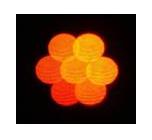May 4 2010
Air Force Office of Scientific Research-supported holographic, adaptive, optics research may help transform software into computer-free, electronics for unmanned aerial vehicles, high energy lasers and free-space optical communications that will enable each to run faster and more efficiently than before.
 Dr. Geoff Andersen, senior researcher at the Laser and Optics Research Center at the United States Air Force Academy in Colorado Springs, is leading a team of researchers who have successfully demonstrated the latest new type of adaptive optics, which incorporate holograms.
Dr. Geoff Andersen, senior researcher at the Laser and Optics Research Center at the United States Air Force Academy in Colorado Springs, is leading a team of researchers who have successfully demonstrated the latest new type of adaptive optics, which incorporate holograms.
Dr. Geoff Andersen, senior researcher at the Laser and Optics Research Center at the United States Air Force Academy in Colorado Springs, is leading a team of researchers who have successfully demonstrated the latest new type of adaptive optics, which incorporate holograms. The conventional, computer-based technology has been in use for over two decades, but is not suitable to some military applications, including UAVs because of its required calculations and high computing costs.
The new technology will be able to be incorporated on unmanned aerial vehicles because it is very compact and lightweight.
"We will see hugely improved images from these new surveillance platforms that holographic adaptive optics will make possible," said Andersen.
"The current system for UAV imagery, lasers and optics is computer software driven, but the next phase is to replace that with an electronics system called High Altitude Large Optics," he said. "Such a system would be orders of magnitude faster than anything else available, while being much more compact and lightweight."
It is hoped that HALOS will become the standard in adaptive optics of the future. It may also create entirely new markets for sharper telescopes and camera images that will be used for military purposes.